#houyhnhnm
Text

TRAVELS INTO SEVERAL REMOTE NATIONS OF THE WORLD BY LEMUEL GULLIVER by Jonathan Swift (London/New York: Macmillan, 1894) Illustrated by C.E. Brock. Introduction by Henry Craik.

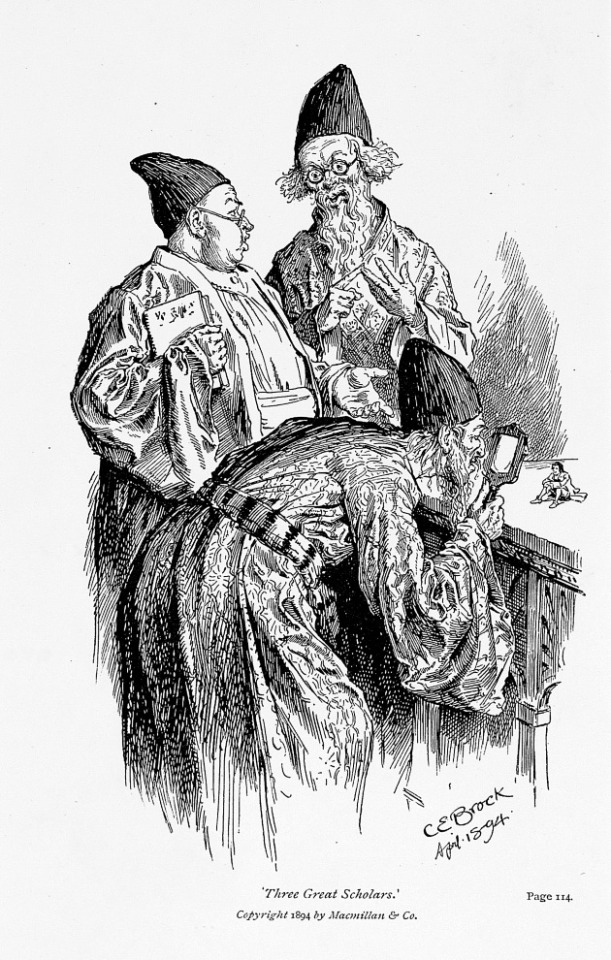







source
#beautiful books#book blog#books books books#book cover#books#illustrated book#vintage books#victorian era#jonathan swift#gulliver’s travels#c.e. brock#lilliput#houyhnhnm#brobdingnag#laputa
27 notes
·
View notes
Text
『HOUYHNHNM』掲載

-PRESS-
HOUYHNHNMの連載【で、NEW VINTAGEってなんなのさ?】にて掲載して頂きました。
関係者各位、ありがとうございます。
ご興味のある方、是非ご覧ください。
https://www.houyhnhnm.jp/news/738445/
#tsgd#thesungoesdown#vintage#fashion#press#newvintage#tsgdtokyo#houyhnhnm#フィナム#掲載#古着#古着屋#ザサンゴーズダウン#下北沢#ニューヴィンテージ
2 notes
·
View notes
Text
F/CE.にまつわる10のコト。
と題して、HOUYHNHNMに当店取扱のF/CE®︎が掲載されていましたので、コチラにも。
巷に溢れている“モノづくり”という言葉。よく聞くし、普段からみんな簡単に使っているけれど、そこに込められたつくり手の想いが1つのプロダクトとして結実するまでには、色々な要素と沢山の人々が関わっているもの。弊誌でもお馴染みのブランド〈エフシーイー(F/CE.)〉においても同様です。毎シーズン、世界中から選んだひとつの“国”をテーマに展開されるコレクションでは、その国を実際に訪れ、生活、歴史、アート、音楽などの文化に触れたインスピレーションをデザインに落とし込むことで知られています。では、それらはどういった背景から誕生しているのでしょうか? 本記事では、視点の異なる10のキーワードから〈エフシーイー〉の過去・現在・未来について、読み解いていきたいと思います。
-
正直、僕もまだ読んでませんがまずはこのTumblrに投稿し、皆さんと一緒にゆっくりと読みたいと思います。
episode 1 ~ 10 までタイトルだけでとても興味深い。密かにチェックしてたフォトグラファーの 大辻 さんが写真を撮ってたりと、色々と知れそうです。
読み終わりましたら、下記リンクのチェックをお願いします。
https://waynt-store.square.site/shop/fce/10 ←↓ Click
-
Waynt Store 結城
-
https://waynt-store.square.site ←↓Click
-
Contact Us
https://www.instagram.com/waynt_store/ ←Follow me
MAIL: [email protected]
-
※Waynt Web Storeでのお買い物の際に 『銀行振込』 でのお支払いを御希望の方は、上記InstagramのDM、またはメールよりご連絡ください。
1 note
·
View note
Photo

WEB MAGAZINE 「HOUYHNHNM」にて、 パタゴニアのキャプリーンについての記事を、 掲載していただきました。 ありがたや。 お時間ある時に、是非ご覧ください。 よろしくお願いします。 #patagonia #パタゴニア #キャプリーン #houyhnhnm #フイナム #tempra #tempracycle #テンプラサイクル #テンプラ #掲載情報 #tokyo #setagaya #gakugeidaigaku #japan (tempra cycle) https://www.instagram.com/p/CfLqPoePs8B/?igshid=NGJjMDIxMWI=
#patagonia#パタゴニア#キャプリーン#houyhnhnm#フイナム#tempra#tempracycle#テンプラサイクル#テンプラ#掲載情報#tokyo#setagaya#gakugeidaigaku#japan
0 notes
Note
hey, gentile here. just came across this post of yours and, first of all- it's SUPERB. it showed me a perspective on being a jewish ally that i really wouldn't ever have considered by myself, made me more confident in my choice to put combating jew-hatred above the friendships I've recently lost, and gave me a really useful direction on where to go as an ally to jewish people onwards. that being said, there's a few details about it I'd like to press you about, if it's not too much trouble.
this point is probably worthy of an eyeroll as i'm a culturally christian atheist (making a concious effort to not be *that* kind of atheist), but: when you refer to G-d as the creator of all things, you stress that that includes evil- but that, in so doing, G-d is not evil themself. now, I'm asking this with the express purpose of you correcting me, so: why does this G-d- as a G-d fundamentally distinct from the Christian conception of God as a Super-Mega-Ultra-Perfect God Who Can Do No Wrong Ever- create evil? i, personally, have been led to believe by @/spacelazarwolf that it is simply because G-d, too, makes mistakes just like any human being, but the way you worded it in this paragraph (which I've included as a screenshot below) had me interpret G-d creating evil as a concious, intentional action. did i just not read it correctly? and, if i didn't, then is the reason G-d creates evil part of this central struggle you went in detail into in the same paragraph, and as such, a very individual part of Jewish belief that no two jews agree on? and if that is so, would you be comfortable with sharing your version of it?
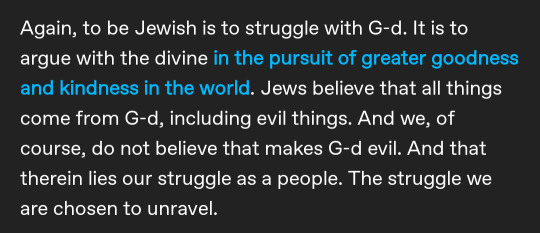
a few paragraphs after that one, you dedicated many words to make it absolutely crystal clear that, in the process of unlearning and combating jew-hatred in the society around me, i should, in spite of the vitriol that they propagate, love the former friends i lost to antisemitism. how- and *why* should i love the people who, on an early october 8th morning, actively celebrated the news of a massacre of Israeli civilians? who mocked- and still mock- the survivors and the families of hostages? who wield the memory of the holocaust as a baton against Jewish people's right to self defense? who deify terror groups who are up to their necks in atrocities? who make an active effort to spit on the face of *reality?* How could i possibly look at the face of a friend who chose allegiance to a terrorist group she did not even know existed four months ago over me- who she had actively interacted with for much longer?
would you rather we called ourselves "gentiles" or "goyim?" I've been calling myself a gentile for the longest time because i see jamming a word from a language i don't speak at all in an otherwise english sentence to be disrespectful and constitute appropriation, but you and other jumblr blogs have given me the impression that that is not the case. furthermore- i believe it was @/bambahalva who pointed out the usage of the word "gentile" in antisemitic segregation policies.
that is all- i hope this message finds you well. oh, yeah one more thing- what do you think of The Forward news network? i came across them by chance and next thing i knew I'd gotten into their newsletter.
WARNING: I HAVE FINISHED WRITING THIS AND IT'S LONGER THAN I EXPECTED AND ALSO MORE JEWISH THAN I EXPECTED LOL! I have done the most Jewish possible thing I could do and answered all of your questions with questions. I'm sorrryyyyyy! This is what happens when you grow up surrounded by rabbis and future rabbis! LMAOO
Oooh! What a good ask! I love this ask. OK, so! Let's go in order.
First of all, thank you so much for your kind words. And thanking you for backing your words with the action of prioritizing kindness over hatred. It matters. More than I can ever explain. Thank you.
You know, it's funny. People ask me a lot of questions about i/p that they think will have simple and straightforward answers that just don't. And I end up writing a lot of essays because of this. The questions you wrote me seem like they should be complex, but feel relatively straightforward to me.
Now, to your first bullet point: I don't know. I truly do not know. I think that G-d is fundamentally just...G-d, and in so being, G-d is truly unknowable to me. I think many Jews have many different interpretations on why G-d creates evil. I'm no rabbi, but one of my BFFs is and so is her mother and great grandfather. That doesn't give me any kind of authority. It just means I've spent a lot of time thinking about theological questions like this. As for my perspective, I'm a progressive/reform Jew, not a humanistic Jew. I do actually believe in G-d, but I vibe with the community philosophies of Humanistic Judaism a lot. So that's the perspective I'm coming from here:
I'm not a particular fan of the Book of Job, because I think it gets twisted and interpreted in Christian ways more than most Hebrew books and it can too easily be twisted into a "Don't question G-d, because G-d is perfect" narrative that I find to be fundamentally at odds with how I practice Judaism. Also, it's just a very sad story about how a good and kind man lost everything, and it makes me sad to think about. HOWEVER, that traditional "Don't question G-d" narrative is not how I learned to think about that book. The way I learned it, I believe the Book of Job describes this issue most explicitly. After Job loses everything he holds dear and talks to all his friends and begs again and again "Why? Why did G-d do this to me? Why would G-d do this to me when I'm a good person?" And basically G-d hears everyone answering for G-d with various reasons, "Maybe you were bad." "Maybe you should make an offering" Maybe this. Maybe that. And eventually G-d responds from within a storm (paraphrased of course) 'Why the fuck do you think it's your business to know? I made the whole universe! I made everything you see. I made the world that gave you your family in your first place. Why do you think you get to question my motives?'
The way I always interpreted that is: I don't fricking know! It's not really my business. What am I gonna do? Stop G-d? How does my knowing why G-d creates evil help anything? It doesn't mean we don't question G-d. It means we should instead focus on what we CAN control. I can't make 10/7/2023 not happen any more than I could stop The Holocaust or form an ocean. That's divine business, not human business. What I CAN do is make the world better now. What use is it challenging things that we cannot change? Things that are in the past? What's the point of asking why bad things happen when we can instead focus on stopping more bad things from happening. G-d named us his people when Abraham fought with G-d to stop the destruction of Sodom and Gomorrah. Abraham repeatedly asked, "But are you sure? But what if there are 100 good people? 50 good people? 10 good people?" And G-d kept responding, basically, 'I mean, there aren't. I know this cuz of how I'm G-d and know all the things. But knock yourself out looking.' My interpretation of this was that G-d doesn't get mad when we do our utmost to help our fellow human beings. G-d gets mad when we waste our energy that we could be using to help our fellow man to instead be angry and rage futilely against the past. I say this as someone with PTSD as someone who attempted to stop a tragedy from occuring and failed and can never understand why. What informs my trauma and what makes it so hard to get past isn't that G-d allowed it to happen. It's that people did. It's that I begged for help before it happened--over and over and over to dozens of adults in various positions of authority in order to prevent this terrible thing from happening (no, I will not now or ever disclose what that thing is). And all the people who could have helped failed me, and now two people are dead. Because someone did an evil, evil thing. And a bunch of other people let it happen. I'm not mad at G-d. I'm mad at people. And yet, I also know that hating people and finding reasons to dismiss them and despise them is what leads to more tragedies like that happening. So, despite my rage, truly the only thing to do is to love people. It's the only that helps. It's the only thing that repairs the world. It's the only thing that we can control. So, in short, my answer to "Why does G-d create evil?" is "Why should I spend my valuable time on earth trying to answer that question when, instead, I can spend that same exact amount of time asking millions of people, 'How can I help? What's wrong, and how can I help make any part of it better?'?" We don't need to understand G-d to make the world a better place. I'm fine leaving G-d stuff to G-d and spending my time on the human stuff.
Now, your second bullet point. Love their souls. You don't have to love what they've done. But they are human beings, as are we all. I think this can also easily be twisted into the Christian framework of "Hate the sin, love the sinner," but that's not what I mean at all. People's evil deeds are a part of them. They need to take responsibility. There is no divine absolution for crimes that people do unto each other in Judaism. If you harm a person, G-d cannot forgive you for that. Only the person or people you harmed can forgive you. And to a certain degree, we are all defined by our actions toward others. And so, no. I do not forgive the terrorists who woke up and decided to kill a bunch of Israelis and Israeli-adjacent humans. I do not forgive those who celebrate the deaths of Israelis because of some misguided sense of justice. I do not forgive the people who continue to send me hatred and death threats day after day after day after day. And I do not love the parts of them that did and do those horrible, unforgivable things. But my goodness. They were babies once. They either had parents who love(d) them, which is so sad, because they have this life of love and they chose instead to fill it with so much hate. Or they didn't have any parents or loved ones or anyone to guide them and, my goodness. That is so sad. How terrifying and alone that must feel. Maybe they have friends and family who love them and are instead wasting their precious time on this planet directing their energy at raging against me and 15 million other Jews they've never met. Or maybe they don't have anyone who loves them and they think that hating me and harming me will bring them some sense of purpose and joy. What a horrid way to live.
My Grandpa died last year. I have a wonderful family for whom I'm very grateful, and I even have good memories with my Grandpa. But he was not a good person. He came from an abusive home, and weaponized that abuse on his loved ones until he drove them all away. He was a narcissist. Not in the pop psychology sense. But in the actual clinical sense. He ruined every relationship that ever mattered to him--personal and professional. And in the end, because of his own actions, he died alone. He had pushed everyone so far (often with legal threats and action) that when he died, he laid on a slab for weeks because nobody could figure out who to call, because he had no one left. (For reference, Jewish burials are supposed to happen rather quickly and two weeks is...not good.) He was the only person in his generation who was not born in Israel--my family on his side has lived in Israel since looooong before even the British Mandate and he was the only person in his family born and raised in the US. As far as we can tell, the family on that side has been in Israel for as long as Jews have existed. He was religious. And while I've never been to Israel or met any of my family there, he did go. And he kept in touch with his relatives there before driving them away too. He was a wealthy man, but convinced himself that everyone only wanted him for his money and then decided to horde it instead. He left nothing to his children or to me. He left all his money in an endowment to his university--a place that uses that money to fund anti-Israel organizations now. He died alone, without his family that lived nearby, and with a legacy that will now cause active harm to the family that lived far away. He could have died surrounded by the loved ones from around the world who wanted nothing more than to be near him and loved by him. His story is a tragedy. The story of every person who chooses hatred over love is a tragedy. The story of someone who woke up and chose to murder others or to delight in the death of others is a tragedy. I love the soul in the center of these people. I loved my grandfather. I could not be around him. I cannot forgive some of the things he said and did. But I love the person he could have been. I love the part of him that gave me some good memories. I love the family he gave to me.
No, we do not all need to love or forgive those who have wronged us or terrorized us or murdered our loved ones. But that is different from mourning a human soul. From loving the potential of a human soul to do good in the world, and mourning the loss of that soul and its potential. Every human being--every single one no matter what they have done in their lives--has the potential to create goodness and make the world a better place. Every moment of every single day is a new chance to meet that challenge and do our best. Sure, not all of us have it in us to try our best every single moment. Sometimes life is hard and we're sad and tired and hungry and angry. And that's ok, because we have tomorrow, and an hour from now, and a minute from now. But the moment someone chooses to take action and decides that action should be to cause another harm or celebrate the harm that was caused? That's a tragedy. And when a life is extinguished, that is a life that loses its potential to try again and do better. We shouldn't love people because we deem them worthy of love. We should love people because they are people. And so are we. And how wonderful is that? I could choose to hate them. It would be so easy! But why should I do that? What do I gain? What do they gain? And isn't it so wonderful that I chose to love instead? And isn't it so wonderful that you can, too?
As for your final bullet point: I have no preference. I say goyim cuz it's easier for me. Goy/gentile/non-Jew are all fine to me. I have some icky feelings about the word gentile for a variety of linguistic reasons I won't bore you with. But some other people don't like when non-Jews appropriate Yiddish words. Others (including me) find it wonderful when non-Jews call themselves goyim. All my closest non-Jewish people call themselves goyim, including my sister! Non-jew is the most neutral in English and least likely to offend anyone. But it still separates Jews as an other whereas "goy" is a way to distinguishing yourself from Jews while also being an acknowledgment of our culture. As far as I'm concerned as long as a goy is being a goy (ally, positive) rather than a goy (derogatory) I don't mind that they call themselves goyim. LOL! Idk, friend. Do what makes you happy! What do you prefer?!
Regarding The Forward news network: They are a reliable Left-Center source with a high credibility and reporting rating and only one failed fact check in the past five years for which they issued a correction. I would consider them a reliable source. They cover legitimate issues of people who support Palestinan self-determination ostensibly being punished for their stances. They publish Op-eds critical of Netanyahu, who is terrible. And they address how antisemitism is harming diaspora Jews. They seem to consistently emphasize the humanity of everyone, which you can tell based on the rest of my post is very important to me, but they also avoid over-editorializing on news that is not in the Op-Ed section. I'll never endorse any source as perfect or guaranteed to be free of problems or harm or bad takes, but they do seem to make a genuine effort to be factual, clear, and wholly truthful. Note: I highly recommend that everyone installs the Media Bias/Fact Check extension on their web browsers. Get in the habit of checking and evaluating sources critically. It's a skill that will serve you your whole life.
@clawdia-houyhnhnm I hope this helps. And thank you for your thoughtful ask and commitment to intercultural understanding. <3
#ask me stuff#clawdia-houyhnhnm#leftist antisemitism#antisemitism#jewish muslim solidarity#jewish goyim solidarity#Judaism#jewish culture#jumblr#how to help#allyship#media literacy
151 notes
·
View notes
Note
itsso funny to me that people think flutterdash is a normal woman x stinky loser ship. gamers, fluttershy lives in a cottage out of town directly next to the eepy ouuper forest. she has like 10-11 friends if you dont count the animals she can somehow talk to and one of those friends is a god of chaos. whenever she gets intoa role she fucking forgets who she even is and needs somepony else to remind her. her friends make a point to not prank her to not hurt her feelings but shes canonically a neon genesis evangelion fan. fellas flutterdash is a freak4freak friendship fluttershy is just marginally better at masking
Fluttershy freak appreciation post
481 notes
·
View notes
Note
tell us more about the rpg youre writing pls?
I won't go into too much detail because it's still in development, but basically:
The working title is Transcendence and we started on it because I went "man. there's a lot of games where you can do weird transhumanist shit but I feel like the weird transhumanist shit is never the centerpiece of the thing. also a lot of the time it's explicitly portrayed as Fucked Up And Evil. we should make a game that fixes this"
playbooks include "cyborg," "wizard / living glitch in reality," and "undead," among others.
some major influences on the setting and the potential threats therein are The Secret World, Control, and Project Moon. although we have explicitly said there's not any major "supernatural suppression"-type agencies, both because we think they would kind of take over the game and because it's funnier to us if the SCP Foundation is fundamentally dysfunctional as an entity but you can get your shit completely rocked by a bigfoot hunter who didn't even have any ill intentions.
also this probably goes without saying: it is very much coming from a place of Being Transgender And Autistic. that being said we're trying to write it in a way that also feels more broadly applicable
83 notes
·
View notes
Note
s/p ninetails from okami. funny kitsune
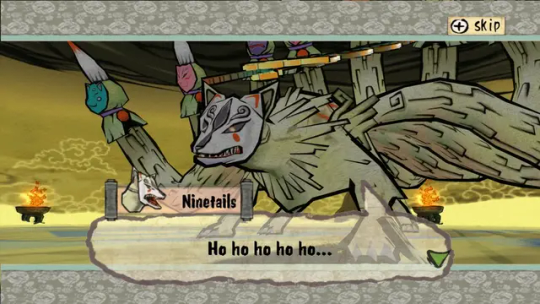
I really shouldn't trust this fox. But... smash. Foxxo sexy, even if her fur does look a bit matted.
28 notes
·
View notes
Text
Found: A 160-year-old Book in a Local Coffee Shop
Near Stockholm’s elegant main library, I wandered into a nearby coffee shop.
The chain which has such shops all over town has a distinctive décor in that the walls, from tabletop level to the tall ceiling, have bookshelves filled with very old books. I assumed the corporate owners ordered some thousands of feet of books from sellers of otherwise unsaleable volumes. I have never seen anyone read…
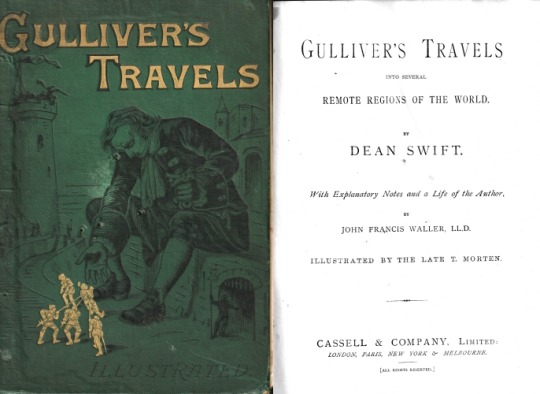
View On WordPress
0 notes
Text
Unraveling Humanity's Foibles: A Journey Through Gulliver's Travels

Jonathan Swift's "Gulliver's Travels into Several Remote Nations of the World" is a literary masterpiece that takes readers on a captivating voyage through the eccentric and fantastical realms of satire and social commentary. Originally published in 1726, Swift's novel presents the extraordinary adventures of Lemuel Gulliver, a ship's surgeon who finds himself shipwrecked on four distinct and peculiar lands, each inhabited by beings with their own peculiar customs and ideologies. Through Gulliver's encounters with the Lilliputians, Brobdingnagians, Laputans, and Houyhnhnms, Swift employs biting satire and biting wit to critique various aspects of human nature, society, politics, and religion.
The novel's first section, set in the land of Lilliput, offers a scathing commentary on the pettiness and absurdity of human politics and power struggles. Through Gulliver's experiences as a giant among tiny inhabitants, Swift exposes the folly of war, bureaucracy, and the arbitrary nature of authority. The absurdity reaches its peak with the absurd ritual of Lilliputian politics, including the infamous "Big-Endians" versus "Little-Endians" dispute, which serves as a thinly veiled critique of religious schisms and sectarianism.
In contrast, the second section of the novel transports Gulliver to the land of Brobdingnag, where he becomes a miniature among giants. Here, Swift shifts his focus to a critique of human vanity, arrogance, and the flawed nature of humanity itself. Through Gulliver's observations of the benevolent yet morally repugnant Brobdingnagians, Swift highlights the inherent depravity and moral corruption of human civilization, challenging readers to confront their own flaws and shortcomings.
The third section of "Gulliver's Travels" takes Gulliver to the floating island of Laputa, a realm inhabited by impractical intellectuals and absurd scientific endeavors. Through biting satire and absurd scenarios, Swift lampoons the folly of intellectualism divorced from practicality, as well as the dangers of unchecked scientific experimentation and technological hubris. The Laputans' obsession with abstract theories and impractical inventions serves as a cautionary tale against the pursuit of knowledge at the expense of humanity's moral and ethical obligations.
Finally, in the fourth section of the novel, Gulliver finds himself in the land of the Houyhnhnms, a society of rational, equine beings who govern themselves with reason and virtue. Through Gulliver's interactions with the Houyhnhnms and their brutish human-like counterparts, the Yahoos, Swift offers a stark critique of human nature itself. The Houyhnhnms' rationality and virtue stand in stark contrast to the base instincts and moral degradation of the Yahoos, leading Gulliver to question his own humanity and the nature of civilization itself.
In conclusion, "Gulliver's Travels" is a timeless work of satire and social commentary that continues to resonate with readers today. Through Swift's masterful storytelling and biting wit, the novel offers a profound exploration of human nature, society, and the follies of civilization. By presenting readers with a series of fantastical yet eerily familiar worlds, Swift challenges us to reflect on our own flaws and shortcomings, making "Gulliver's Travels" a compelling and thought-provoking read for audiences of all ages.
Jonathan Swift's "Gulliver's Travels into Several Remote Nations of the World" is available in Amazon in paperback 16.99$ and hardcover 22.99$ editions.
Number of pages: 344
Language: English
Rating: 9/10
Link of the book!
Review By: King's Cat
#Gulliver's Travels#Jonathan Swift#Satire#Social commentary#Political allegory#Lilliputians#Brobdingnagians#Laputa#Houyhnhnms#Yahoos#Fantasy#Adventure#Exploration#Critique of society#Political satire#Human nature#Travel narrative#Political intrigue#Cultural differences#Moral lessons#Allegorical fiction#Absurdity#Irony#Critique of government#Parody#Political corruption#Religious satire#Intellectualism#Scientific hubris#Moral degradation
0 notes
Text
Unraveling Humanity's Foibles: A Journey Through Gulliver's Travels
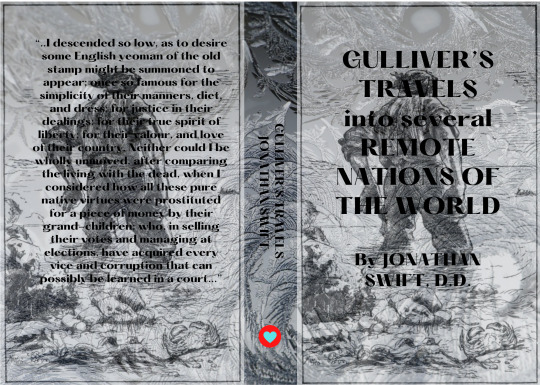
Jonathan Swift's "Gulliver's Travels into Several Remote Nations of the World" is a literary masterpiece that takes readers on a captivating voyage through the eccentric and fantastical realms of satire and social commentary. Originally published in 1726, Swift's novel presents the extraordinary adventures of Lemuel Gulliver, a ship's surgeon who finds himself shipwrecked on four distinct and peculiar lands, each inhabited by beings with their own peculiar customs and ideologies. Through Gulliver's encounters with the Lilliputians, Brobdingnagians, Laputans, and Houyhnhnms, Swift employs biting satire and biting wit to critique various aspects of human nature, society, politics, and religion.
The novel's first section, set in the land of Lilliput, offers a scathing commentary on the pettiness and absurdity of human politics and power struggles. Through Gulliver's experiences as a giant among tiny inhabitants, Swift exposes the folly of war, bureaucracy, and the arbitrary nature of authority. The absurdity reaches its peak with the absurd ritual of Lilliputian politics, including the infamous "Big-Endians" versus "Little-Endians" dispute, which serves as a thinly veiled critique of religious schisms and sectarianism.
In contrast, the second section of the novel transports Gulliver to the land of Brobdingnag, where he becomes a miniature among giants. Here, Swift shifts his focus to a critique of human vanity, arrogance, and the flawed nature of humanity itself. Through Gulliver's observations of the benevolent yet morally repugnant Brobdingnagians, Swift highlights the inherent depravity and moral corruption of human civilization, challenging readers to confront their own flaws and shortcomings.
The third section of "Gulliver's Travels" takes Gulliver to the floating island of Laputa, a realm inhabited by impractical intellectuals and absurd scientific endeavors. Through biting satire and absurd scenarios, Swift lampoons the folly of intellectualism divorced from practicality, as well as the dangers of unchecked scientific experimentation and technological hubris. The Laputans' obsession with abstract theories and impractical inventions serves as a cautionary tale against the pursuit of knowledge at the expense of humanity's moral and ethical obligations.
Finally, in the fourth section of the novel, Gulliver finds himself in the land of the Houyhnhnms, a society of rational, equine beings who govern themselves with reason and virtue. Through Gulliver's interactions with the Houyhnhnms and their brutish human-like counterparts, the Yahoos, Swift offers a stark critique of human nature itself. The Houyhnhnms' rationality and virtue stand in stark contrast to the base instincts and moral degradation of the Yahoos, leading Gulliver to question his own humanity and the nature of civilization itself.
In conclusion, "Gulliver's Travels" is a timeless work of satire and social commentary that continues to resonate with readers today. Through Swift's masterful storytelling and biting wit, the novel offers a profound exploration of human nature, society, and the follies of civilization. By presenting readers with a series of fantastical yet eerily familiar worlds, Swift challenges us to reflect on our own flaws and shortcomings, making "Gulliver's Travels" a compelling and thought-provoking read for audiences of all ages.
Jonathan Swift's "Gulliver's Travels into Several Remote Nations of the World" is available in Amazon in paperback 16.99$ and hardcover 22.99$ editions.
Number of pages: 344
Language: English
Rating: 9/10
Link of the book!
Review By: King's Cat
#Gulliver's Travels#Jonathan Swift#Satire#Social commentary#Political allegory#Lilliputians#Brobdingnagians#Laputa#Houyhnhnms#Yahoos#Fantasy#Adventure#Exploration#Critique of society#Political satire#Human nature#Travel narrative#Political intrigue#Cultural differences#Moral lessons#Allegorical fiction#Absurdity#Irony#Critique of government#Parody#Political corruption#Religious satire#Intellectualism#Scientific hubris#Moral degradation
0 notes
Text
i've come to learn that Jing Yuan is not fond of the sound of howling, not because he dislikes large dogs in any capacity... but because to him, howling means an approaching borisin pack, a sign that frequently sparks dread. compared to the other two major axes of the denizens of abundance, the wingweavers and houyhnhnms (who have declined far more greatly in strength than the borisins), Jing Yuan is perhaps the most experienced with and the most worried by the borisin. the borisin are cruel, sadistic, and he has seen his fair share of comrades torn apart by their jaws, even nearly losing his own life to them on more than one occasion. Jing Yuan does not dream often, but on the rare occasion that he does, the memories of borisin war howls, blood red canines and pheromone-induced fear in the midst of a battle wrought in pitch darkness and rain tend to follow him to sleep.
13 notes
·
View notes









